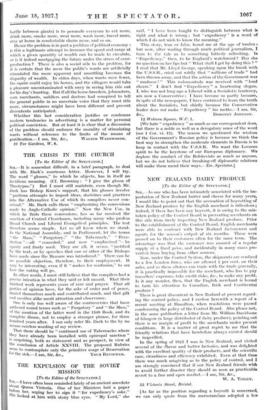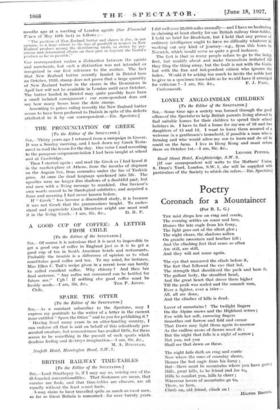NEW ZEALAND DAIRY PRODUCE
[To the Editor of the SPECTATOR.]
SIR,—As one who has been intimately associated with the im- portation of New Zealand butter and cheese for many years, I would like to point out that the accusation of boycotting of New Zealand produce by the English merchant is ridiculous ; indeed, if there has been any boycott, it is owing to the mis- taken policy of the Control Board in preventing merchants on this side from freely importing New Zealand produce. Prior to the establishment of the Control Board, English merchants were able to contract with New Zealand factorymen and agents for the season's output a six months. These were passed on to their customers often for the same term. The advantage was that the customer was assured of a regular supply at a fixed price, and incidentally in many cases pre- vented from buying from other sources.
Now, under the Control System, the shipments arc confined to a few London firms, who are allowed 2 per cent. on their sales, and as these allotecs can trade with the trade generally, it is practically impossible for the merchant, who has to pay travellers' expenses, take credit risks, &c., to make any profit. Is it any wonder, then, that the English merchant is bound to turn his attention to Canadian, Irish and Continental produce ?
There is great discontent in New Zealand at present regard- ing the control policy, and I enclose herewith a report of a recent meeting at Hamilton, when resolutions were passed condemning the policy of the Control Board. Also please not, in the same publication a letter from Mr. William Davidsone of Glasgow (a large distributor of dairy produce), pointing out: there is no margin of profit to the merchants under present conditions. It is a matter of great regret to me that the friendly relations that have heretofore always existed should be imperilled.
In the spring of 1925 I was in New Zealand, and visited several of the cheese and butter factories, and was delighted with the excellent quality of their products, and the scientific' care, cleanliness and efficiency exhibited. Even at that time there was much misgiving as to the policy of control, and I am strongly convinced that if our New Zealand friends wish to avoid further disaster they should as soon as practicable revert to a free and open market.—I am, Sir, &c.,
55 Victoria Street, Bristol.
W. A. TITLEY.
[As far as the position regarding a boycott is concerned, we can only quote from the memorandum adopted a few
months ago at a meeting of London agents (See Financial Vmcs of May 16th last) as follows .
" The position of New Zealand butter and cheese is slue, in our opinion, to a large extent to the loss of goodwill in respect to New Zealand produce among the distributing trade, as shown by per- sistent and determined efforts on their part to boycott• the Board's produce as far as possible."
Cur correspondent makes a distinction between the agents and merchants, but such a distinction was not intended or recognized in our first reference to the matter. The fact that New Zealand butter recently landed in Bristol bore an October, 1926, stamp does not prove that a large quantity of New Zealand butter • in the stores in the Dominions in April last will not be available in London until next October. The butter landed in Bristol may quite possibly have been a small isolated consignment : our correspondent does not say how many boxes bore the date stamp.
According to prices ruling recently the New Zealand butter seems to have been preferred to Danish in spite of the defects attributed to it by our correspondent.—En. Spectator.]



























































 Previous page
Previous page